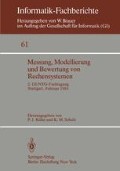Abstract
Since the late sixties many publications on paging and related topics have been published dealing with theoretical and practical page replacement algorithms (see references in [1]). If we consider the algorithms based on the LRU (least recently used) principle there are two basic approaches for solving the page replacement problem in a multiprogramming environment: Global (e. g. global LRU) and local (e. g. WS [1] and PFF [13]). The “global LRU” type of algorithms will select for replacement the system wide least recently used pages. This approach is used by many available Operating Systems. It shows satisfactory behavior over most workloads as long as the load on main storage is not too high. The main problem with this approach is the use of “real age” (i. e., the elapsed real time since the page was last referenced) as the basis of page replacement. The real age is, as discussed in section 2, inherently unstable for many programs operating at optimal memory allocation. Global LRU is therefore, in general, not optimal. Available Operating Systems offer additional support to help the user protect critical applications from loosing their pages [2,3].
Access this chapter
Tax calculation will be finalised at checkout
Purchases are for personal use only
Preview
Unable to display preview. Download preview PDF.
References
Denning, P. J.: “Working Sets Past and Present”, IEEE Transactions on Software Engineering, Vol. SE-6, Janaury 1980.
“MVS: Overview”, No. GC28-0984, IBM System Reference Library, June 1978. See also “MVS: Initialization and Tuning Guide”, No. CD28-0681, IBM Systems Reference Library, May 1979.
“MVS-System Extensions, Release 2 Installation Guide”, GG24–1508-00, 8/1/80, WTSC Poughkeepsie.
Coffman, E. G.; Denning, P. J.: “Operating Systems Theory”, Prentice Hall Inc., Englewood Cliffs, New Jersey.
Morris, J. B.: “Demand Paging Through Utilization of Working Sets on the Maniac II”, Communications of the ACM, October 1972.
Rodriguez-Rosell, J.; Dupuy, J.P.: “The Design, Implementation, and Evaluation of a Working Set Dispatcher”, Communications of the ACM, April 1973.
Graham, G. S.; Denning, P. J.: “On the Relative Controlability of Memory Policies”, in Computer Performance (edited by K. M. Chandy and M. Reiser), North Holland Publishing Company, 1977.
Franklin, M. A. et al: “Anomalies with Variable Partition Paging Algorithms”, Communications of the ACM, March 1978.
Abu-Sufah W. A.; Padua, D. A.: “Some Results on the Working Set Anomalies in Numerical Programs”, IEEE Transaction on Software Engineering, Vol. SE-8, March 1982.
Slutz, D. R., Traiger, I. L.: “A Note on the Calculation of Average Working Set Size”, CACM, Vol. 17, No. 10, October 1974.
Mattson, R. L.: “Evaluation Techniques for Storage Hierarchies”, IBM Systems Journal, NO. 2, 1970.
Smith, A. J.: “Multiprogramming and Memory Contention”, Software — Practice and Experience 10, 531 – 552 (1980).
Opderbeck, H., Chu, W. W.: “Performance of the page fault frequency algorithm in a multiprogramming environment”, Proc. IFIP Congress, 1974
Author information
Authors and Affiliations
Editor information
Editors and Affiliations
Rights and permissions
Copyright information
© 1983 Springer-Verlag Berlin Heidelberg
About this chapter
Cite this chapter
Liefländer, G., Schmutz, H., Silberbusch, P., Steimle, R. (1983). An Adaptive Working Set Algorithm. In: Kühn, P.J., Schulz, K.M. (eds) Messung, Modellierung und Bewertung von Rechensystemen. Informatik-Fachberichte, vol 61. Springer, Berlin, Heidelberg. https://doi.org/10.1007/978-3-642-68830-0_30
Download citation
DOI: https://doi.org/10.1007/978-3-642-68830-0_30
Publisher Name: Springer, Berlin, Heidelberg
Print ISBN: 978-3-540-11990-6
Online ISBN: 978-3-642-68830-0
eBook Packages: Springer Book Archive

